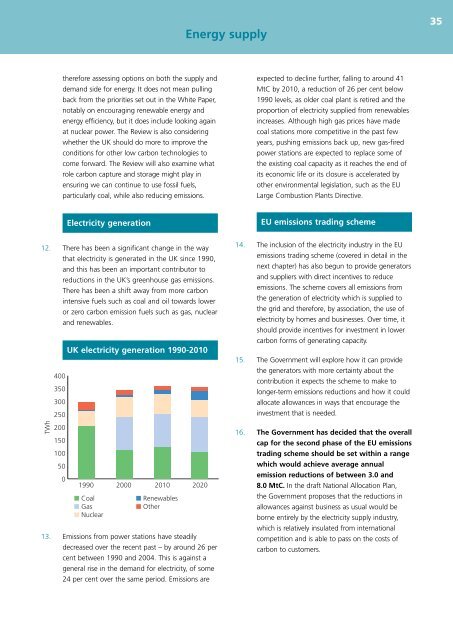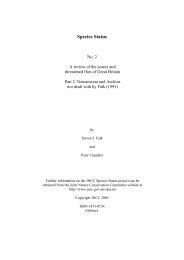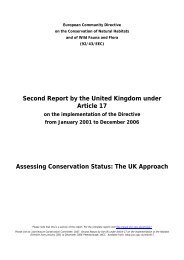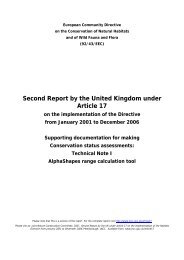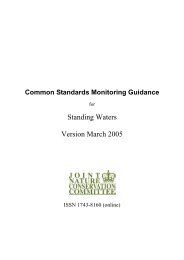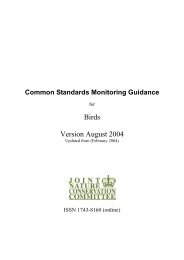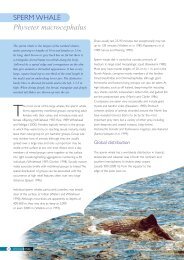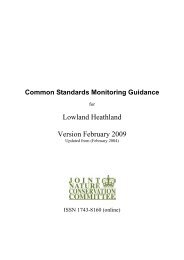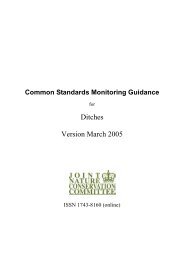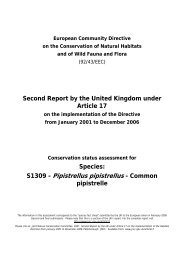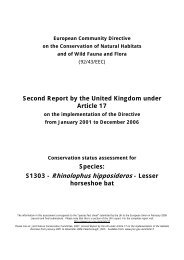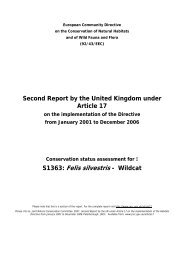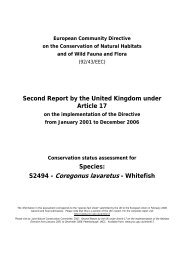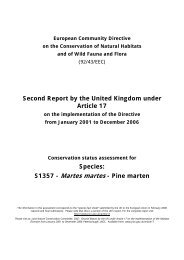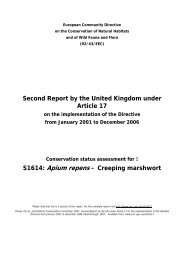UK Climate Change Programme 2006 - JNCC - Defra
UK Climate Change Programme 2006 - JNCC - Defra
UK Climate Change Programme 2006 - JNCC - Defra
Create successful ePaper yourself
Turn your PDF publications into a flip-book with our unique Google optimized e-Paper software.
Energy supply<br />
35<br />
therefore assessing options on both the supply and<br />
demand side for energy. It does not mean pulling<br />
back from the priorities set out in the White Paper,<br />
notably on encouraging renewable energy and<br />
energy efficiency, but it does include looking again<br />
at nuclear power. The Review is also considering<br />
whether the <strong>UK</strong> should do more to improve the<br />
conditions for other low carbon technologies to<br />
come forward. The Review will also examine what<br />
role carbon capture and storage might play in<br />
ensuring we can continue to use fossil fuels,<br />
particularly coal, while also reducing emissions.<br />
expected to decline further, falling to around 41<br />
MtC by 2010, a reduction of 26 per cent below<br />
1990 levels, as older coal plant is retired and the<br />
proportion of electricity supplied from renewables<br />
increases. Although high gas prices have made<br />
coal stations more competitive in the past few<br />
years, pushing emissions back up, new gas-fired<br />
power stations are expected to replace some of<br />
the existing coal capacity as it reaches the end of<br />
its economic life or its closure is accelerated by<br />
other environmental legislation, such as the EU<br />
Large Combustion Plants Directive.<br />
Electricity generation<br />
EU emissions trading scheme<br />
12. There has been a significant change in the way<br />
that electricity is generated in the <strong>UK</strong> since 1990,<br />
and this has been an important contributor to<br />
reductions in the <strong>UK</strong>’s greenhouse gas emissions.<br />
There has been a shift away from more carbon<br />
intensive fuels such as coal and oil towards lower<br />
or zero carbon emission fuels such as gas, nuclear<br />
and renewables.<br />
TWh<br />
400<br />
350<br />
300<br />
250<br />
200<br />
150<br />
100<br />
50<br />
0<br />
<strong>UK</strong> electricity generation 1990-2010<br />
1990 2000<br />
Coal<br />
Gas<br />
Nuclear<br />
2010 2020<br />
Renewables<br />
Other<br />
13. Emissions from power stations have steadily<br />
decreased over the recent past – by around 26 per<br />
cent between 1990 and 2004. This is against a<br />
general rise in the demand for electricity, of some<br />
24 per cent over the same period. Emissions are<br />
14. The inclusion of the electricity industry in the EU<br />
emissions trading scheme (covered in detail in the<br />
next chapter) has also begun to provide generators<br />
and suppliers with direct incentives to reduce<br />
emissions. The scheme covers all emissions from<br />
the generation of electricity which is supplied to<br />
the grid and therefore, by association, the use of<br />
electricity by homes and businesses. Over time, it<br />
should provide incentives for investment in lower<br />
carbon forms of generating capacity.<br />
15. The Government will explore how it can provide<br />
the generators with more certainty about the<br />
contribution it expects the scheme to make to<br />
longer-term emissions reductions and how it could<br />
allocate allowances in ways that encourage the<br />
investment that is needed.<br />
16. The Government has decided that the overall<br />
cap for the second phase of the EU emissions<br />
trading scheme should be set within a range<br />
which would achieve average annual<br />
emission reductions of between 3.0 and<br />
8.0 MtC. In the draft National Allocation Plan,<br />
the Government proposes that the reductions in<br />
allowances against business as usual would be<br />
borne entirely by the electricity supply industry,<br />
which is relatively insulated from international<br />
competition and is able to pass on the costs of<br />
carbon to customers.


